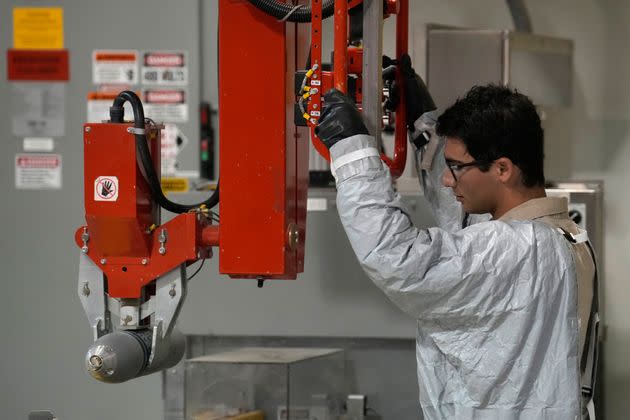U.S. Has Destroyed Its Final Chemical Weapons, Pentagon Says
The Pentagon on Friday confirmed that the U.S. destroyed the final chemical weapons in its stockpile to comply with a deadline mandated by the international Chemical Weapons Convention.
The U.S. had until Sept. 30 to eliminate the weapons under the 1997 agreement, which 193 countries have joined. The treaty bans the development, production, acquisition, stockpiling, retention, transfer or use of chemical weapons among its parties.
The last remaining sarin nerve agent-filled M55 rocket was destroyed Friday at the Blue Grass Army Depot in Kentucky, the Defense Department said in a press release.
The department described the moment as a “disarmament milestone decades in the making.”
Watch as the last munition, an M55 rocket, in the U.S. chemical weapons stockpile is destroyed at #BGCAPP July 7, 2023. @OPCW#HonoringOurCommitmentpic.twitter.com/oBIRNZg9AG
— acwanews (@acwanews) July 10, 2023
The U.S. previously destroyed its last mustard gas munition in June at the Army’s Pueblo Chemical Depot in Colorado, the department said.

A technician works to destroy the United States' chemical weapons stockpile at the Army's Pueblo Chemical Depot on June 8 in Pueblo, Colorado.
About 90% of the country’s chemical weapons were destroyed by 2012, but the remaining 10% required more time given the “complicated approach of neutralizing these chemicals,” the Pentagon said Monday.
William LaPlante, the undersecretary of defense for acquisition and sustainment, said the completion of destruction operations reinforces “the United States’ commitment to creating a world free of chemical weapons.”
Mallory Stewart, the assistant secretary of state for arms control, verification and compliance, echoed LaPlante, saying it was a major moment for not just the U.S. but the world.
“This achievement is indicative of the important role that international cooperation and transparency play in arms control and disarmament,” Stewart said.
Pentagon officials have also assisted other countries, including Russia and Syria, in destroying their chemical weapons. Still, Stewart warned that those two nations may have not fully eliminated their stockpiles, saying that they have used such weapons on their own citizens.
But as the U.S. celebrated the destruction of its chemical weapons, President Joe Biden’s administration on Friday said that it would send cluster munitions to Ukraine amid the country’s war with Russia, a controversial move that some lawmakers have vocally opposed.
The use of cluster bombs is banned in many nations due to their potential to cause civilian casualties.
Secretary of State Antony Blinken defended the administration’s decision, saying the shortage of traditional weapon stockpiles means that Ukraine would be “defenseless” if the U.S. didn’t step in.
“The hard but necessary choice to give them the cluster munitions amounted to this: if we didn’t do it, we don’t do it, then they will run out of ammunition,” Blinken said Tuesday on MSNBC’s “Andrea Mitchell Reports.”

